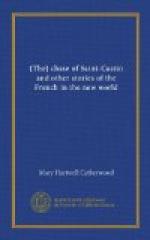Their permanent settlement was about the fort, on land he had paid for, but held in common with them. They went to their winter’s hunting or their summer’s fishing from Pentegoet. It was the seat of power. The cannon protected fields and a town of lodges which Saint-Castin meant to convert into a town of stone and hewed wood houses as soon as the aboriginal nature conformed itself to such stability. Even now the village had left home and gone into the woods again. The Abenaqui women were busy there, inserting tubes of bark in pierced maple-trees, and troughs caught the flow of ascending sap. Kettles boiled over fires in the bald spaces, incense of the forest’s very heart rising from them and sweetening the air. All day Indian children raced from one mother’s fire to another, or dipped unforbidden cups of hands into the brimming troughs; and at night they lay down among the dogs, with their heels to the blaze, watching these lower constellations blink through the woods until their eyes swam into unconsciousness. It was good weather for making maple sugar. In the mornings hoar frost or light snows silvered the world, disappearing as soon as the sun touched them, when the bark of every tree leaked moisture. This was festive labor compared with planting the fields, and drew the men, also.
The morning after La Hontan sailed, Saint-Castin went out and skirted this wide-spread sugar industry like a spy. The year before, he had moved heartily from fire to fire, hailed and entertained by every red manufacturer. The unrest of spring was upon him. He had brought many conveniences among the Abenaquis, and taught them some civilized arts. They were his adopted people. But he felt a sudden separateness from them, like the loneliness of his early boyhood.




